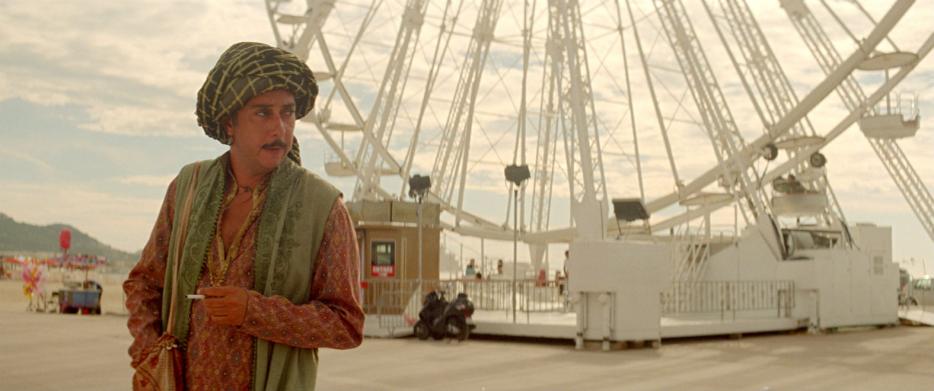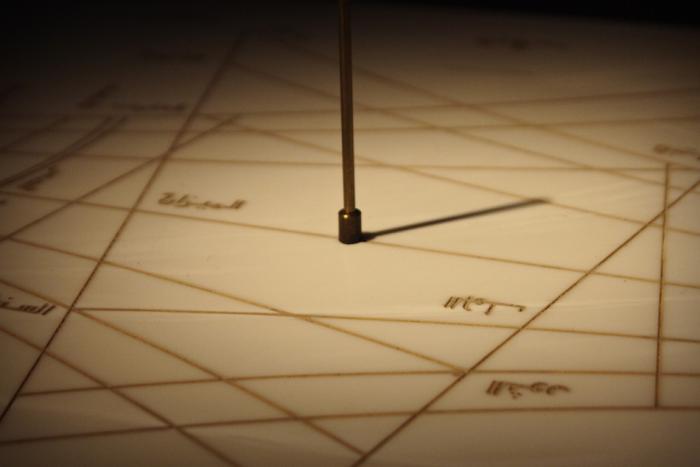I saw Arabian Nights this summer at a sold-out public screening at the Karlovy Vary International Film Festival in the Czech Republic. The three-volume, 381-minute Portuguese epic is a buoyant, ecstatic thing, brimming with joy and gusto; it is, I’d like to think, not so much a challenge or endurance test as a pure cinematic delight. The rest of the audience didn’t seem to agree. Within twenty minutes they began streaming out the door—by the end of the first volume the crowd had thinned from more than three hundred to a little over ten. So much for my gauge of what’s accessible.
Arabian Nights is a “rock and roll film,” in the words of its director, Miguel Gomes. And Gomes himself seems the quintessential rocker: coolly laidback, often found sitting in a leather jacket with a cigarette dangling from his mouth. These days Gomes is angry with the world, as any good rocker ought to be. With Arabian Nights he aspired to make a film that was not only vigorous and vital, but politically charged, addressing with justified rancor the economic crisis that had crippled his homeland in the years before. And so here he’s built a menagerie of wicked caricatures and scathing barbs, over the course of the movie’s six-and-a-half-hour sprawl, tackling the country’s debts and cataclysms one at a painstaking time.
We caught up with Gomes by phone to talk politics, nostalgia, and why Arabian Nights is really a blockbuster.
*
How are you?
I’m fine. I’m doing interviews.
That must be fun. Perhaps.
It’s very exciting. No, I’m just joking. I can think of a hundred things better to do than this, but I can also recall a list of a hundred worse things to do. So it’s okay.
Somewhere in the middle. Good. So, to begin, let’s compare Arabian Nights to your previous film. Tabu was elegant, almost stately even. This film, though it has elegance, it is overall more unbridled, unrestrained—it’s an extravagant film.
You know, in Cannes, when I was presenting the film at Director’s Fortnight, I said before each screening, “let’s rock and roll.” This film in a way is more rock and roll than Tabu. It doesn’t mean it’s better or worse. It’s simply more rock and roll. It’s also a more wild film. You said a good word: unrestrained. In this case I had to interact with two things: one was this title, Arabian Nights. Knowing that I should have something that would connect with the wild aspect of the book, which is also very rock and roll. Rock and roll was not invented in the time that the stories were written, but it’s quite wild and rock and roll. So the film should be not so nostalgic or so elegant. It should be more aggressive. I wanted the film to be quite chaotic.
And the second thing?
Yes, the second thing I had to deal with is what was happening with the Portuguese society. It was not a peaceful time. So the film doesn’t want to be diplomatic at all, dealing with these issues. I had to put all the different emotions that I—as a Portuguese guy living in this time of crisis, of economic and social crisis in Portugal—would have to react to this, to the things happening here. This gives the film its more unrestrained aspect.
Do you think the length has something to do with it, in that you have more room to be more experimental, trying new things? To be more daring?
To do more different things, yes. I don’t know if it’s more daring, or if it is that’s because of the duration or space. Mostly I was reacting to the things happening in the country and reacting with different moods: sometimes the film could get angry, sometimes the film could get sad. The range of what I was proposing to film was huge. I think that the film should have also this huge range, and have the elasticity to go from one thing to the other.
It’s an angry film, angry politically. The first story in particular, The Men with Hard-Ons, seems to be the most overtly political and overtly satirical. It’s the story that most explicitly satirizes the government. Were you trying to sort of get the satirical stuff out of the way early?
Yeah, it was important to me to have this satirical story at the beginning. Though I think that in the second volume, The Tears of the Judge, the trial segment, it’s also very satirical — though in a different way. But having these guys in power—the Prime Minister of Portugal and the guys from the European Union who implement measures of austerity—it was important to have this at the beginning. But in the second volume, and maybe it doesn’t look it, I also feel there’s anger in it too. It’s the most cruel. Maybe it’s not in the same way as in in the satirical story of the men with the hard-ons. But for instance at the end of the first volume you hear the exploits of these guys, the Magnificents. There’s lots of anger concentrated in these stories, provoked by the feeling of not being able to help them. Perhaps the first story is more aggressive as farce or as a satirical narrative.
Yes, true. And not just aggressiveness.
Right, there’s also the opposite. There’s the flashback to childhood. There’s the attitude of the prime minister drawing unicorns and carving with his swiss knife his name in the tree. It’s something that clashes with the more aggressive style of the farce, of the satirical comedy. For me I cannot isolate one feeling in each segment. What’s interesting for me is to have the clash of different moods and different elements that sometimes seem like the opposite of the other.
Certainly. And I think the segments I responded to most strongly were those in which the extremes were most apparent. Tears of the Judge is very funny but also very sad. My favorite segment is The Owners of Dixie, and that’s devastating, but at times, I felt, quite joyous, even blissful.
Yeah.
It’s strange to say bliss in a sequence that involves suicide …
I have this theory. For me cinema is like electricity. You have to have two very different things, like batteries: a negative and a positive charge. Then you can have electricity, because you get a charge from the two different things. You are relating to two different feelings. This for me is when things start to be interesting. It’s well-known that in my previous films the two poles are reality and the imaginary—that’s the source of some of the film’s electricity.
I remember when Tabu came out, a lot of the reviews and interviews had to explain this concept of nostalgia that was particular to Portugal—saudade, I believe it’s called. I wondered if in this film there were any concepts or ideas that wouldn’t be clear to an audience that isn’t Portuguese in a similar way?
Even if it’s true I cannot control it, so I cannot do anything. The only way I can conceive of making films is making them personal. Of course, before I was a filmmaker I was first a viewer, like everyone else, like any person who goes to the theater to see a film. To think of myself as a viewer is very important to me. And I’ve always considered myself a good viewer. Being a viewer of cinema is something that is part of me when I’m making films: I’m the first viewer of my own films, which is why I know when a shot is done or whether I need to try another take. I only try to make films that I would like to see as a viewer. I have the hope, of course, that I can share this—that this isn’t only for me but that will also please other people. I make films that I would want to see, and I hope there’s an audience for it. But I’m not able to think whether it will be more suitable or better understood for an audience of my country.
What about once they’ve actually been seen and discussed?
When I release the film I have some impressions of these kinds of things. For instance, when I released Our Beloved Month of August, I found out that it was very popular in Latin America. Mostly in the countries in the south, it was very received—much more than in the north. Of course when I was making the film I wasn’t thinking about that. Then I tried to figure it out: okay, maybe it’s a more Latin kind of cinema, or maybe people connect in a familiar way with it. But then Tabu came out. It was received well in the south too, but there was much more interest in the States and in the north of Europe. It was much more well received than the previous film. Now, I don’t know. I’m just starting to release Arabian Nights, it was just recently bought by some countries, but I cannot figure out when I’m making a film if it will be more prestigious in some countries than in others.
Of course. As a viewer, then, of your own film, did you envision watching Arabian Nights in three separate parts at a three seperate times or in one go?
No. Some people are saying that the decision of splitting the film into three volumes has something to do with commercial interests. But in fact it’s not. At first the film was just one film, as you’d ordinarily make. But when I began to shoot for weeks and weeks I started to realize that at some point I would have to make a choice in editing: I would either have to remove some stories from the film or invent a way to have them. When I was editing I understood that we had material for three films. And these three films would be very different—the experience would be different from one film to the other. We could organize this journey through three films like the long film of Arabian Nights.
And you were totally satisfied with that decision?
Well, it pleased me because it has the form of a blockbuster—but I knew it would not be a blockbuster. It’s an artisanal, serial blockbuster, like a superhero Marvel thing, you know? Or like Mission: Impossible or something like this. It would be a serial, but made in a very artisanal way. It’s an arthouse blockbuster. As I told you about the theory of the batteries, I like contradictions. Making a blockbuster that would not be a regular blockbuster, it pleases me.
People will have the opportunity to see the film’s three volumes at different times or in succession. What, for you, is the ideal way to watch it?
I don’t know. Being a viewer of cinema is for me an important part of me, an important part of being alive. But there are many good things to do. There are films which are not so enjoyable. But I feel very happy being a viewer of a good film. In this case, I have designed the film to be seen in this order—so for the viewer that I am, this is the film that makes sense for me. It draws a line: there’s an arc being drawn in this path from one to two and from two to three. That, for me, makes sense. But I also tried to design each volume to be autonomous—to work in not such a complex way. Each volume would be a satisfying experience of cinema. You could change the order. This happens. It happens every day. People are free to watch the films however they want to do. People can change what I program.
Is that frightening to you, to cede control in that way?
Not, it’s not frightening. It’s good. Watching it how you like creates another kind of film, I guess, and I don’t have any problem with that. I think it’s nice that the film could be seen in a way that I hadn’t thought of. You could start at the end and go to the first and then see the film in the middle, or whatever. You can’t control things and it’s good that you can’t control them. We can’t control other people. This is a positive thing.
Of course the structure seems in a way to demand that you begin with volume one. You introduce the story with two framing devices: there’s Scheherazade and her stories and you, as yourself, running from the crew and telling the stories of Scheherazade to the crew. But interestingly we don’t conclude by wrapping up in the expected way.
I think the film is always passing the ball to other narrators. Even within the volumes it’s happening: I pass the ball to Scheherezade but then you have the cockerell speaking and, in his own way, the guy from the union inventing this crazy story for the doctor. In general everyone is ready to take the place of me or Scheherazade in the film. But in fact I do come back in the end. In the third volume Scheherazade has a crisis, when she asks herself whether she can continue to tell stories because she begins to lose faith. At that moment I appear next to the ferris wheel where she’s having a discussion with her father. So there I am! For only five seconds, but I am there.
I think I read in an interview that this moment was unplanned—done on a whim, even.
Yeah, it’s true. Normally I don’t do these kinds of things but in this case I could not resist the wardrobe. I said, okay, I want to dress myself as an actor in Arabian Nights and appear next to the big wheel. Of course in editing we decided to put this shot in. But I also knew that Scherezade and I were connected. In the first volume when I pass the ball to her to continue telling the stories, I know that we are in some sense in the same boat. If she goes down, the ship goes down. In that moment I reappear next to her for that reason.
It’s a really stunning shot—I think in part because it’s shot so lushly on 35mm.
Mmhmm.
And much of the rest of the film is on 16mm, yes?
Yeah. Everything that is shot in Portugal is 16mm. It was important to me. I really enjoy 16mm: I used it already in Tabu, in the second half, in black and white. Our Beloved Month of August was filmed in 16mm too. I’m used to working with 16mm and I really enjoyed that. But I wanted to have this more rich look for the very strange Baghdad sequences. It’s like if it was The Wizard of Oz: Baghdad in the film is Oz. It’s an imaginary land. It’s the land of cinema. It’s the land where you can tell stories. The stories in Portugal, meanwhile, are mostly of people who are poor, and 16mm is more appropriate — it’s a little more blurred, if you compare it to 35mm, more grainy.
And, unusually, the film is shot in Cinemascope.
Right. I think I always wanted to film everything in Scope. It’s the first time I’ve used Cinemascope. But normally you don’t use Cinemascope in 16mm—the grain gets even worse because of the anamorphic lenses. This is the battery theory coming back. The screen has the form of the epic, of Ben Hur and all this stuff. But the image is poor, and more messy. It’s a contrast of formats: the screen and the grain of 16mm.
One of the most astonishing moments in the film is when you first cut from the 16mm material to a dazzling shot of Scheherezade on a boat in the sun on 35. It’s a breathtaking moment. Now that you mention it I suppose Wizard of Oz is the obvious reference point there, cutting from black and white to Technicolor, but it actually reminded me of Godard’s In Praise of Love.
Godard is the master of making things clash. The cinema works a lot with the clash of very different elements. He’s been doing it for ages, Godard, and when I started to make films, in my way to get here, I was in each moment more and more interested in being heterogeneous. We can do it with the film stock, like this, but we can also do it by contrasting non-actors and actors. Or by changing moods: starting the film as one thing and ending as another very different thing. This is also important.
In Tabu, of course, you didn’t just play with different styles or contrasting images, but actually adopted a new mode altogether: the silent film. Do you feel like working in and familiarizing yourself with the silent film vocabulary had any influence on the technique of Arabian Nights?
I don’t know. Maybe it’s a different thing, but I think there’s some of that in the use of text in the third volume of Arabian Nights and changing the style of narration between volumes. The first two volumes make use of voice-over narration. But in volume three it’s visual and the voice-over is in our mind: it’s a mute voice-over. That connects, for me, with the absence of dialogue in Tabu. But maybe that’s just me—maybe I’m the only person to make that connection.
What was it about the stories in the third volume that made you want to abandon the traditional voice over narration and switch to text?
We knew that the volume would start with Scherezade. We decided, at first, that we should have a new person to narrate. We thought about having a sort of collective voice over talking about Scherazard, giving a fake biography of her life, told by the virgins on the island. In the beginning of the film we have a kind of choir of men—the men who are going to lose their jobs at the shipyard. We thought we might have the same thing on this island and the women. But it wasn’t working. Instead we started to use text, and we changed the idea: instead of a biography of Scheherazade we thought it would be more interesting to have an encylopedia of the community of people living in Baghdad. For me the text in this case opens a new dimension of the image. The text provides the image with something it doesn’t already have. It creates scale.
Let me ask you about Hot Forest. It comes in the middle of volume three and feels in some ways like an odd intrusion—though it too has an interesting approach to narration, in that its story is told rather than shown.
Hot Forest is the shortest story in the trilogy—I think it’s like five minutes. And in fact for a moment it was going to be in the first volume. There was a moment when it was the beginning or the end of the first volume, I don’t recall which. It’s very difficult: if you have a five-minute segment you have to place it very carefully. But ultimately I decided to have it divide the bird trapping episode in the middle, so that it becomes two. You have an introduction to the trappers, then Hot Forest, then the competition of the bird songs. In a way it concentrates this clash between fiction and reality, and also this clash between private and public—the individual and the collective. Hot Forest is about a clash between a public group and a voice that is completely out of place in the image. The narrator is telling a love story that doesn’t seem to belong to the country we’re seeing. I think it was very important to put this story in the third volume, when you have a visible opposition between lonely characters, eccentric characters, and the collection of the people we meet, the community.
At the beginning of Arabian Nights you speak of a creative crisis: you can’t make a film without addressing the economic crisis in Portugal. Having now made that film, having made a film that addresses the crisis, are you free to move on?
Yes. I have this impression that every time we start a new film it’s like starting from the beginning. Maybe this is one of the reasons my films are so different—between Tabu and Arabian Nights, they’re so different. It’s because it was two different moments: I was different, my interests were different, at each moment my desires for cinema are changing. So I’m not able to say what kind of film I’ll make next. But I know it will be something else. I’m through with Scheherezade. But I don’t think I’ll ever be through with Portugal — but the next Portugal will be a different one.






